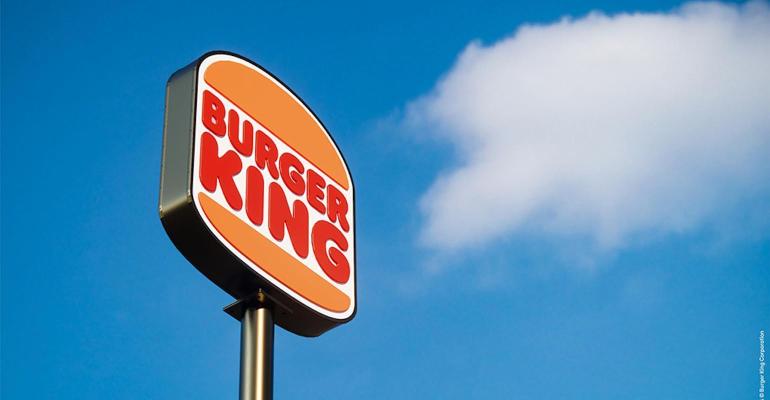Restaurant Brands International Inc.’s U.S. Burger King franchisees jumped on the company’s “Reclaim the Flame” investments, oversubscribing the $250 million “Royal Reset” program within weeks, executives said Thursday.
The Toronto-based quick-service company, which also owns the Firehouse Subs, Popeyes Louisiana Kitchen and Tim Hortons brands, released earnings for the third quarter ended Sept. 30 and updated investors on its $400 million U.S. Burger King investment plan outlined in September.
In addition to increased spending on marketing for Burger King’s “Have It Your Way” and “You Rule” platforms, the company pledged to invest $250 million in what it called the “Royal Reset” for U.S. restaurants, which are operated by about 500 franchisees, as part of the larger program.
The company in September pledged to invest $50 million over the next two years for a restaurant refresh program that is expected to affect about 3,000 of the company’s more than 7,000 U.S. units. Another $200 million was designated for a remodel program that is expected to impact about 800 restaurants over the next two years.
José Cil, RBI’s CEO, said the $250 million included a “capital investment of $50 million in a restaurant technology, kitchen equipment and a building enhancement refresh program: and the “the Royal Reset remodel program that provides access to $200 million of funding for high-quality, high-return remodels.”
The refresh and remodel program was expected to reach about half the restaurants in the U.S. system, he said.
“We're encouraged with the level of enthusiasm and commitment from franchisees to participate in the $50 million refresh, which includes a dollar-for-dollar matching investment from franchisees,” Cil said. “We opened a two-week application process in mid-October and were oversubscribed before closing out.”
Cil said the Burger King field teams were now going through the diligence process of approving each investment request for kitchen equipment, building enhancements and restaurant technology. He added that the company is “prioritizing those that we believe will drive the greatest returns for each restaurant through this program.”
Cil said the company’s $200 million remodel program had also drawn strong interest.
“That gives us confidence in our ability to execute on this program,” he said, and was “a very encouraging sign, especially given the current macroeconomic pressures facing many across our industry.”
Incentives in the program included upfront capital for the franchisees upon completion of the remodel project, rather than royalty or other credits that had been historically the norm.
“We're reducing our franchisees need to draw from other sources of capital to facilitate their investment,” Cil noted. “That being said , we recognize that many will need to tap other sources, and we're working with franchisees — those with and without strong financial footing today — and their lenders to position them well for the future.”
Cil said, “Our top priority with this program is quality over quantity. Our goal is to not only bolster the health of the system overall but also create positive momentum for franchisees to further invest in their portfolios over the long term.”
Part of the investments will be made in improving digital platforms at Burger King units, Cil added. The company said that in the third quarter digital sales grew 26% year-over-year to about $3.4 billion, representing a third of systemwide sales.
Joshua Kobza, RBI’s chief operating officer, said the company had updated all 50 of its Burger King restaurants in the Miami area with new point-of-sale terminals running on proprietary software as well as new kitchen display monitors, indoor and outdoor menu board screens and upgraded cabling and Internet.
“The restaurant teams are thrilled and can swap their time from solving technology problems to improving the guest experience,” Kobza said, which had improved guest satisfaction scores by about 30% since 2021. Those improvements can be a basis for other restaurants in the system, he noted.
For the third quarter ended Sept. 30, Restaurant Brands International’s net income rose to $530 million, or $1.17 a share, from $329 million, or 70 cents a share, in the same period last year. Revenues rose to $1.726 billion from $1.495 billion in the prior-year quarter.
The strong U.S. dollar impacted results, with RBI saying foreign exchange rates totaled a loss of near $30 million.
Systemwide global same-store sales were up 9.1% with increases of 10.3% at Burger King, 9.8% at Tim Hortons and 3.1% at Popeyes.
As of Sept. 30, Restaurant Brands International had nearly 30,000 restaurants in more than 100 countries, including 19,401 Burger Kings, 5,405 Tim Hortons, 3,928 Popeyes and 1,234 Firehouse Subs.
Contact Ron Ruggless at [email protected]





